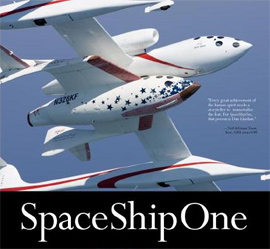
No sooner had SpaceShipOne safely landed in the Mojave Desert, making history as the first privately-funded manned space vehicle, than government officials rekindled their desire to regulate this nascent private industry. Such concern for the safety of future space travelers is commendable but somewhat disingenuous, given Congress’ rather poor record of oversight in maintaining the safety of NASA’s Space Shuttle program.
On Monday, October 4th, 2004, piloted by a civilian, SpaceShipOne reached space for the second time in two weeks. As reward for such a remarkable feat Mojave Aerospace Ventures, a private company headed by aeronautic legend Burt Rutan and funded by billionaire Paul Allen, will receive the $10 million Ansari X-Prize.
The revolutionary SpaceShipOne project was started by Burt Rutan partially in response to the challenge setup by the X-Prize. The prize was created to reward the first privately funded team that sent a three-person spacecraft into space on two different flights within a two-week period. With approximately $30 million in funds Rutan and his group were able to achieve this amazing goal in a relatively short amount of time and claim the award.
These historic spaceflights are on par in importance and significance with the Wright Brother’s first powered flight a hundred years ago. The success of this venture is a testament to the ingenuity, skill, hard work, and dedication of a small group of pioneers that accomplished something extraordinary. Mark down one more success story for private enterprise and the American spirit.
While Rutan’s company was busy making history and revolutionizing the space travel industry, our concerned representatives in Washington were busy drafting legislation to regulate a commercial space industry that does not yet exist. Showing great concern over our safety, officials are once again working to expand the power of the government, this time into space. For months now they have been trying to pass legislation to protect us from ourselves. Such fretting over our well-being is indeed commendable, but given the myriad problems we have seen with NASA, our officials should strive to clean up their own act first before reaching for more control and responsibility.
America’s Space Shuttle program, paid for with our tax dollars and managed by the government, was supposed to have cost approximately $10 million per launch and allow for a few days turnaround time between flights. How good was NASA at estimating? The program now costs $500 million for each shuttle launch, with a turnaround time of a few months, assuming there are no glitches or catastrophic failures. Speaking of such tragedies, it seems that no amount of government regulation and oversight was able to eliminate the disastrous losses of the Challenger shuttle on take-off in 1986 and the Columbia orbiter on re-entry in 2003. Presently NASA’s shuttle fleet is grounded at least until next summer, while America’s space program is wholly dependent on Russia to shuttle our astronauts to and from the International Space Station. Now we’re supposed to hand over the reigns of the private space industry to that same group?
No one disputes the good intentions of our elected officials and their concern about the dangers of space travel. But there’s a sage saying about a proverbial road to hell being paved with such intentions. Some reasonable government regulations do indeed serve a worthy purpose and have been helpful in supporting commerce, insuring the integrity of the stock market, cleaning up the environment, and protecting consumers. However, the impulse to over-regulate and stifle freedom and innovation in the name of “safety” is an ever-present danger with the government behemoth.
Already thousands upon thousands of unnecessary rules and regulations control every aspect of our lives. In the name of safety, conservation, or any one of a myriad of other worthy justifications, a massive body of laws now constrict our liberties and limit our personal autonomy. Even the volume of water used when toilets are flushed is now determined by government bureaucrats. Such substantial encroachments into our liberties are contrary to the American spirit of freedom, risk-taking, and personal responsibility. This was never the intent of our Founding Fathers and the limited government they had envisioned.
Relinquishing control to government has the effect of creating a “nanny” state where individuals give up more of their freedoms and choices, in exchange for the promise of collective “security” and “comfort.” This in turn transfers personal responsibility from individuals and empowers government to act on their behalf, allowing more and more adults to skirt their personal responsibilities and avoid adulthood. A state of perpetual adolescence has been established.
Ricardo Semler, the CEO of Semco, a successful private Brazilian company, remarked than in their organization
“we always assume that we’re dealing with responsible adults, which we are. And when you start treating employees like adolescents by saying that you can’t come late, you can’t use this bathroom – that’s when you start to bring out the adolescent in people.”
Officials in Washington should heed Mr. Semler’s advice and begin treating American space pioneers like the mature and intelligent adults that they are. Government is already too big, too inefficient and too overextended to start regulating space. It was smart enough to leave the Internet alone and let it flourish and prosper. Now it needs to get out of the way and stay out of space. One planet is more than enough for them to play with. Leave space for the rest of us.

